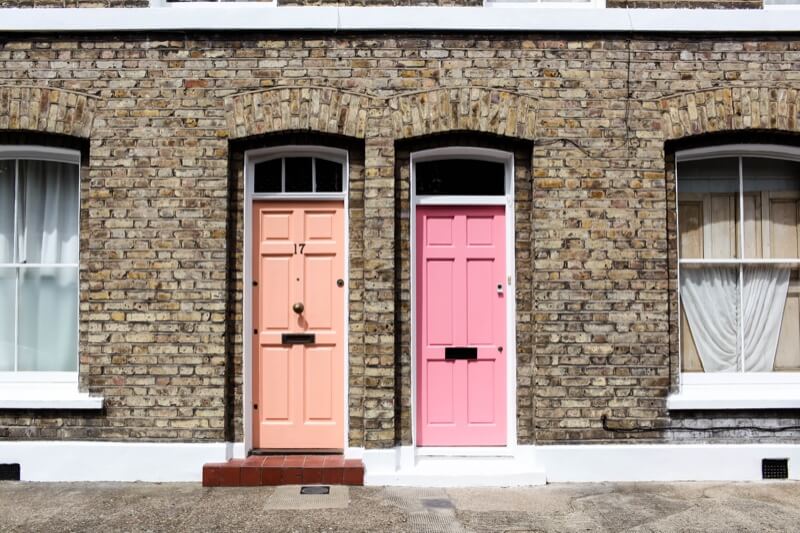The different types of mortgages

How many types of mortgages are there?
It can can be tricky to know where to start when it comes to the different types of mortgages. So to get things started, we'll be taking a look at the two most common mortgage types and terms that you may come across on your search for mortgage products before we go on to the mortgage definitions:
- Fixed rate mortgages
- Variable rate mortgages
To put it really simply, the main difference between the two types of mortgages comes down to the interest rates (sometimes called 'mortgage rate') that the lenders apply. Interest rates (or mortgage rate) in the world of mortgages are the annual/monthly cost to you for borrowing the money from a lender. You'll usually find they're shown as a percentage of your loan (in this case, a mortgage) and you typically pay interest on a monthly basis, alongside your capital repayments on your mortgage (until you reach the end of your mortgage by paying it off).
Fixed rate mortgages
As the name might suggest, fixed rate mortgages are where the interest you pay to your lender is fixed over a specified amount of time (such as for two, three or five years). While you have the fixed rate mortgage, your monthly payments will remain the same (again within those two, three of five years) and won't be affected by any changes to interest rates on the wider financial markets.
You may typically find fixed rate mortgages are available for between two and five year periods, however there may be exceptions to this out there. You might also find that fixed rate mortgages come with higher interest rates. This could be because it's harder for the lenders offering them to predict what might happen in the wider market over time. And since you're on a fixed rate, your lender cannot change the interest rate that they apply to you while you're in this term, so your monthly payments will stay the same.
For some people, fixed rate mortgages may be an attractive option because you know what your repayments on your mortgage will be every month. On top of this, you may find additional peace of mind as you'll know your repayments won't suddenly rise if interest rates on the wider financial markets see an increase. As you'll see when we come on to the other types of mortgage.
However, since your monthly repayments can't go up on a fixed rate mortgage, they also won't go down. This could mean that if rates fall, you may end up paying more in monthly repayments than if you were to have a variable rate mortgage. You also need to plan ahead for when your specified “fixed term” ends, as you typically go onto the standard variable rate (see below), which may be different to what you were paying under the initial rate.
Variable rate mortgages
As you might now expect with these mortgages, the interest rate that applies to you can change over time, meaning your monthly payments can change. And that works both ways, as it can go up or down, which is largely dependant on what's happening with the wider financial markets.
With variable rate mortgages, there are actually three different kinds (with subtler differences between them) that are worth exploring:
1) Standard variable rate (SVR) mortgages
Standard variable rate (SVR) mortgages are typically a common offering from most lenders. Unlike a tracker mortgage, which we'll come on to, a standard variable rate mortgage's interest rate is set by the individual lenders (rather than the Bank of England base rate). This means that the rate that applies to you could change at any time, as the lender is in control of their standard variable rate.
You may find that you'll be placed on an SVR when an existing term ends on a fixed rate or another type of variable rate mortgage products. However, it's worth knowing that a lender's SVR typically comes with a higher rate of interest than any deal you might have previously been on. So, you may want to consider your options when approach the end of your existing deal.
2) Tracker mortgages
With tracker mortgages, you'll find that the interest rate moves up and down. However, a key difference between the tracker mortgage and standard variable rate (SVR) mortgage is that the interest rate changes in line with the Bank of England Base Rate. For some, tracker mortgages may be appealing when the Bank of England Base Rate is lower (or due to decrease), as it will likely mean the interest rate you pay will also be lower. It may be less appealing if the base rate rises, or is due to rise, as the rate you pay will follow the Base Rate that the Bank of England sets.
You might find with tracker mortgages that they come with a mortgage 'cap' or a 'collar'. A mortgage cap is the maximum that your rate can rise to. While a mortgage collar is the very minimum that your rate can reach. This is even if the Base Rate rises above or below them. For some, a cap may be appealing as they know how much the interest rate can rise to at the very most. However, you might find capped tracker mortgages are rare and hard to come across.
3) Discount variable rate mortgages
Discount variable rate mortgages are a type of mortgage that also come with a variable interest rate , but the a key difference to a SVR mortgage is that they come with a 'discount' on the lender's own SVR. This may usually be presented as an 'introductory term' that you pay when you take out the mortgage and the discount typically applies for between two and three years
As an example, a lender may have an SVR of 4.50%, but they offer a discount of 2%. This means the the rate that applies to you is 2% for the first few years and the likelihood is you then move to the SVR of 4.50% or you look to remortgage (which is where where you take out a new mortgage on a property you already own to replace your existing mortgage).
Other types of mortgages
While fixed and variable rate mortgages are typically the most common types of repayment mortgage available on the market, other more specialist repayment mortgages can sometimes be available. While we don't cover them here, there are also mortgages available known as interest-only. As the name suggests, with interest-only mortgages, you only pay back the interest on the mortgage rather than interest plus capital repayments that you'd pay back to your lender with a repayment mortgage.
We've picked a few repayment mortgages which may be relevant, depending on your individual circumstances:
1) Mortgages when you're self-employed
If you're self-employed, getting a mortgage can sometimes be a painful exercise. Typically, this is because lenders want to see steady and stable return's income from a person's business in order to reduce the risk of lending them money through a mortgage.
Unfortunately there isn't a specific 'self-employed mortgage' out there on the market anymore. Instead, anyone who is self-employed will apply for the same types of mortgages as those who are employed by someone else, but lenders will want to understand a few more things about them first.
For example, if you're self-employed, lenders may generally want to see two years worth of accounts (which would ideally be signed off by a chartered accountant). On top of this, being able to show steady or growing profits for your company or evidence of future income (such as new clients or contracts) may also help with your application for a mortgage.
If you're self-employed, you may want to check out our dedicated article on mortgages for self-employed people.
2) Guarantor mortgages
A guarantor mortgage is where a family member (such as a parent) of yours supports you by taking on some of the risk associated with the mortgage by becoming your guarantor. Typically, as part of becoming a guarantor, they'll offer what's known as a 'security' against your mortgage that will be used to cover any missed mortgage payments that you might make.
Guarantor mortgages may allow you to borrow up to 100% of the property's value from a lender. This may be helpful for some who have no deposit, but it's worth noting that 100% mortgages can be very rare, may be hard to be accepted for and they can come with more risk (particularly for your guarantor). Should you default on your mortgage to the point where your home may be repossessed and sold, your guarantor could be liable to make up any shortfall between the sale price and the amount outstanding on the original loan.
As with most mortgages we'd suggest that you seek out independent advice from a professional mortgage or financial advisor if you're interested in finding out more about guarantor mortgages.
3) Bad credit mortgages
When you've got bad credit, such as Count Court Judgements (CCJs) or bankruptcy in your credit history, getting a mortgage may be seen as a tough task.
While it may be harder and your options may be limited, getting a mortgage when you have bad credit might not always be impossible. One type of mortgage that could be available is a 'bad-credit mortgage', which you may find are available from specialist lenders. These lenders might give more consideration to difficult circumstances when assessing your application and bad credit position.
However, it's worth knowing that they may apply higher rates to what they're willing to lend you, call for a larger deposit (e.g. 25% of the property's value) towards the home you're interested in and have specific rules and criteria on what they will or won't accept.
While there may be bad-credit mortgage options out there, you may want to consider improving your credit score before trying to apply for a more traditional or standard mortgage. There are plenty of guides out there, such as on MoneySavingExpert as to how you could approach improving a bad credit score if this applies to you.
What type of mortgage should I choose?
As with most things when buying a house, there's no one-size-fits-all approach that will suit everyone and it can be a big decision to make. And that applies to the mortgage types covered in this article. The mortgages that may be out there on the market when you start on your journey towards homeownership may suit different people and their individual circumstances.
Below we go through some of the questions you may want to think about when looking at different mortgage types.
1) Fixed or variable rate mortgage?
While some people may favour knowing exactly what their repayments are going to be every month, over a certain period with a fixed rate mortgage, others may seek out the lower rates that can typically come with variable rate mortgages. Between the two main different types of mortgages, it could come down to how predictable you want your monthly outgoings to be in terms of keeping up repayments on your mortgage.
More stable and steady repayments may appeal to those buying for the first time, where perhaps your budget is tighter and you're looking to reduce your outgoings once you're in your new home. While those with a bit of a financial buffer may want to explore whether variable mortgages comes with cheaper rates that work out better in the long term.
2) What length of mortgage deal should I think about choosing?
Again, for some, there may be peace of mind in knowing any outgoings repayments may be fixed or that the discount on a variable rate is in place for a set period of time. While others may opt for greater flexibility in having a shorter deal in place where they can switch between lenders and deals.
When looking at your options and thinking about what you might prefer, there are a couple of things to look in to or think about, which could have some influence over the decision you make:
- Knowing when any introductory deal or rate or term may come to an end
- How much you might end up paying in mortgage fees if you're planning on switching between deals (remortgaging) more often
- How often you plan to move or stay in the property. If the property might not be a long-term home for you, a longer deal may not make sense
- How long the whole mortgage term is for. A mortgage taken out over longer period may mean you end up paying more interest in the long-term
- How old you might be when you reach the end of the mortgage term. If you're planning on retiring by a certain age (and it comes before your mortgage term ends), you should think about whether you could keep up repayments on your mortgage (as your home may be repossessed if you don't)
Wrapping it all up
When it comes to each of the above decisions, it can help to understand more about your home buying circumstances before you start to seriously look at which type of mortgage may be right for you. Knowing what your deposit and total household income is, as well as the potential cost of the property you're interested in, can be a good place to start. Our guide to buying a home of your own may be worth looking at if this is something you're interested in doing.
Ultimately, to ensure you're making the right decision for your financial circumstances, we'd suggest that you always seek independent advice from a professional mortgage or financial advisor when considering which mortgage type might be right for you. If you do not keep up with your mortgage repayments, your home may be repossessed by your lender.
Alternatives to mortgages
If, after some research, you're not sure if a mortgage is for you, then it might be worth looking at other products. One option could be Wayhome.
With Wayhome's Gradual Homeownership option, you're able to buy with a 5% deposit and there's no mortgage or lending involved. Instead, Wayhome arranges a partnership between you and our funding-partners (big institutions like pensions funds) to buy the home you're interested in together, in cash.
If you were to buy 5% of the home with your deposit, you would pay rent on the remaining 95% of the home. This rent then goes to the funding partner, who bought the majority of the home. And any excess rent you pay each month goes towards building increased equity in your home.
To find out more about how Gradual Homeownership with Wayhome works, just click the first link below. Or alternatively, you can read through some of our Frequently Asked Questions (FAQs) from other people by clicking the second link below.
*This article was written prior to Covid-19 impacting the UK residential property market. Any information relating to mortgage products, availability or eligibility was correct at the time of writing and may have since been subject to changes by regulatory bodies or lenders.



